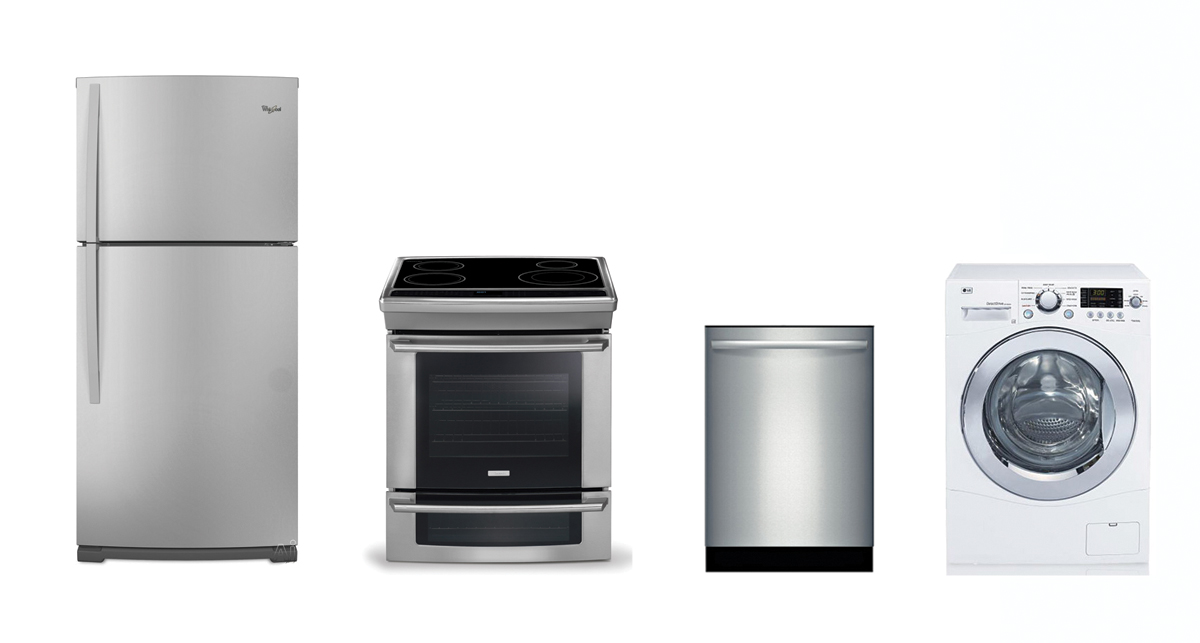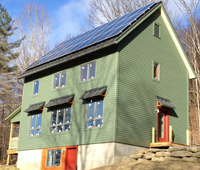Appliances
As Larry mentioned in the last post, we have ordered our appliances and they are due to arrive in the next 2-3 weeks. I’ve been researching appliances and keeping an eye on prices for the past 2 years; constantly updating our short list as new models came out and old ones were discontinued. There is an endless variety to choose from, but we were able to narrow our choices down to fit a few key criteria:
- All electric. Gotta make use of our solar power.
- Efficiency. You will have more flexibility if you’re willing to forgo having a matching suite. Luckily (?) there’s only a few design styles for appliances, so it’s still possible to have very similar looking pieces that could pass for a matching set if you don’t look to closely at the logos.
- Size. We left no wiggle room, so the range and fridge had to fit in the 30” space we allotted for them in the floor plan at the beginning.
- Budget. Most efficient doesn’t necessarily have be the most expensive.
Top Ten USA is an good website to start when shopping for energy efficient appliances as it compiles a short list of the most efficient products from the ENERGY STAR list and includes prices. For more detail or to broaden your search, you could use either the Consortium for Energy Efficiency (CEE) or the ENERGY STAR websites. The energy efficiency information in the product charts is similar on both sites, but the CEE also assigns a handy tier certification rating to products that qualify. The American Council for an Energy Efficient Economy (ACEEE) website has a good consumer resources section that offers shopping guidance and tips for saving energy. The major box store websites are useful for finding price ranges and reading user reviews.
Be aware: The Energy Star program’s criteria for which models qualify changes as of January 20, 2012. Some appliances that could previously claim Energy Star status may no longer qualify, and showroom labeling might be outdated.

FRIDGE: Whirlpool WRT359SFYM * $800-900 * CEE Tier 3 * 30% more efficient than federal standard. To save energy, we wanted a bottom or top-mounted freezer configuration, without an ice-maker or water dispenser, and under 20 cu. ft. in size.
DISHWASHER: Bosch SHX500 Series * $800-900 * CEE Tier 2 * 27% more efficient than federal standard. Asko and Bosch models dominate the top of all the energy efficiency lists, but Bosch is more easily available in our area so it was the obvious place to start looking. We were looking for an Energy Factor (EF) of at least 0.65 or an estimated energy use of less than 340 kWh/year, low water use, a no heat dry option, delay start option, and quiet due to our open floor plan. This particular model has an EF of .83, energy use of 259 kWh/year, water use of 2.95 gallons/cycle, and a sones rating of 46 dBA. Bosch offers an overwhelming variety of dishwashers with an assortment of features - many with even lower energy and water use - so price was the biggest deciding factor here.
RANGE: Electrolux Wave-Touch Series EW30IS65JS * $3199 * (Ranges are not Energy Star rated.) To save money, early on we decided to install an electric range instead of a separate cooktop/oven, and the kitchen was wired with that in mind. I really wanted a slide-in model instead of a freestanding one - mostly due to aesthetics, but also to help keep grease and crumbs from getting caught between the cabinets and the range. Induction was intriguing but a bit outside of our budget, so we selected a conventional GE model with a convection oven in the $1200-1300 price range. In the beginning of November we started reconsidering induction as a more energy efficient option. While there are many induction cooktops and freestanding ranges available, the Electrolux Wave-Touch is currently the only slide-in range that has all the burners with induction. It just happened to be twice as much as the previous model we picked out and it never goes on sale. In hindsight, if we had known we were going to spend this much from the beginning we may have opted to have a separate cooktop/oven instead (and installed the appropriate wiring and cabinet configurations) just to have more flexibility and choice. As it is, we’re glad that if there’s only one model available, at least it’s a well reviewed one. We may have busted our budget with this, but we are both really happy we were able to switch to induction. Now I just have to buy some new stainless cookware to use with it.
RANGE HOOD: Broan 41000 Series * $79-90 * (Range hoods are not Energy Star rated.) We went ductless to preserve the integrity of the building envelope and our air sealing. Our ERV has a “boost” option in the kitchen and bathroom to quickly move air out of those areas, so this range hood is just for filtering grease/steam and supplying light to the cooking surface. We’ll let you know how this system works after we’ve used it a bit.
LAUNDRY: LG 24” Compact Front Load Washer WM1355HW * $899-999 * CEE Tier 2 * 90% more efficient than federal standard. / LG 24” Compact Electric Condensing Dryer DLEC855W * $899-999 * (Dryers are not Energy Star rated.) Again, ventless to preserve the air sealing was the main decider here, but the compact size and front-loading style are also energy savers. There were only two condensing models available in our area - these LGs and the Bosch Axis. Not only were the LGs less expensive, but the washer was also rated more efficient with a Modified Energy Factor (MEF) of 2.40 and a Water Factor (WF) of 4.4. They also came with the stacking kit, whereas Bosch charged extra. I have read reviews that said the condensing dryers take longer to dry than vented dryers, but we plan to only use the dryer whenever we can’t use our laundry line. (Still the most energy efficient way to dry clothes.)
Side note: We hadn’t planned to be buying our appliances in November, but since that’s how the timing worked out we decided to try to take advantage of Black Friday sales (a marketing event I’ve gone out of my way to avoid in the past.) There seemed to be some really good deals on appliances that weekend, but not on any of the models we had selected. In fact, prices on each of these items were $50-100 more in November than they were over the summer. If I have to buy appliances again, I will be shopping the July 4th or Labor Day sales. On the other hand, the iPhone and iPad came in extremely handy when shopping at stores that offered price-matching. They easily paid for themselves last weekend.

Categories
- Air sealing 13
- Appliances & Fixtures 4
- Art 3
- Award 4
- Bathroom 8
- Batteries 1
- Decor 5
- Design 10
- Electrical 5
- Energy Calculations 13
- Energy Monitors 4
- Farm 1
- Finance 1
- Flooring 3
- Foundation 9
- Framing 8
- Heating 9
- House 7
- Insulation 8
- Kitchen 6
- Landscaping 3
- Lessons Learned 1
- Performance 60
- Plumbing 10
- Porch 5
- Radon 1
- Rainwater catchment 3
- Research / study 1
- Roof 7
- Septic / Waste water 2
- Sheetrock 6
- Siding 9
- Site Work 22
- Smart home 1
- Solar 64
- Solar Obsessed 10
- Stairs 2
- Surveying 3
- Ventilation 8
- Weather 1
- Windows & Doors 14
- plug-in 3
Archive
- Jan 2021 1
- Dec 2020 2
- May 2020 1
- Jan 2020 1
- May 2019 1
- Jan 2019 3
- Sep 2018 2
- Aug 2018 2
- Jan 2018 1
- Oct 2017 2
- Apr 2017 1
- Jan 2017 1
- Oct 2016 2
- Aug 2016 1
- Apr 2016 2
- Jan 2016 2
- Nov 2015 2
- Oct 2015 1
- Jul 2015 1
- May 2015 1
- Apr 2015 1
- Jan 2015 1
- Dec 2014 1
- Nov 2014 2
- Oct 2014 4
- Sep 2014 2
- Aug 2014 1
- Jul 2014 1
- Mar 2014 3
- Feb 2014 2
- Jan 2014 2
- Nov 2013 1
- Oct 2013 1
- Sep 2013 1
- Jul 2013 3
- Apr 2013 3
- Jan 2013 3
- Dec 2012 2
- Nov 2012 3
- Oct 2012 1
- Sep 2012 3
- Aug 2012 3
- Jul 2012 2
- Jun 2012 1
- May 2012 3
- Apr 2012 2
- Mar 2012 4
- Feb 2012 4
- Jan 2012 5
- Dec 2011 4
- Nov 2011 9
- Oct 2011 10
- Sep 2011 9
- Aug 2011 6
- Jul 2011 6
- Jun 2011 12
- May 2011 8
- Apr 2011 4
- Mar 2011 5
- Jan 2011 6
- Dec 2010 9
- Nov 2010 3
- Oct 2010 4
- Sep 2010 6
- Aug 2010 8
- Jul 2010 6
- Jun 2010 3
- May 2010 3
- Apr 2010 1
- Mar 2010 3
- Feb 2010 3
- Dec 2009 1
- Jun 2009 1
- May 2009 1
- Feb 2009 1
- Dec 2008 1
- Nov 2008 1
- Jun 2008 1
